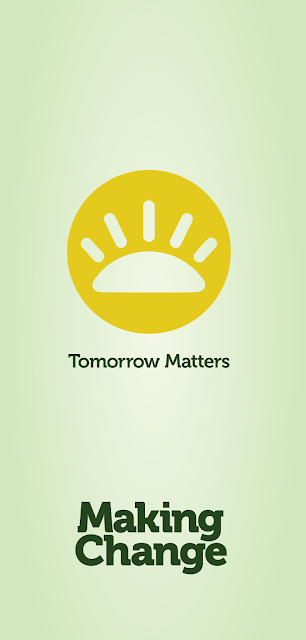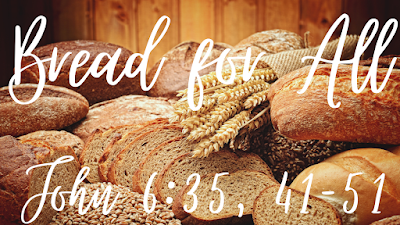Tomorrow Matters - Matthew 6:34 (Christ the King Sunday)
Do you know what a paradox is? A paradox is defined as “a seemingly absurd or self-contradictory statement or proposition that when investigated or explained may prove to be well founded or true.” Our faith as Christians is rife with paradoxes. Let me name a few: Christians conquer through surrender; we see the unseen; we lead by serving; and, we are strong when we are weak. Those are but a few. One preacher from another generation said “that without paradoxes there is no Christianity.” We wrestle today with another paradox—living today with an eye on the future.
It’s particularly challenging for us to think about the future in light of Jesus’ own words to us in Matthew’s Gospel. In the Sermon on the Mount, when he’s laying out the new ethic for the Kingdom of God, we hear him talk to his disciples about not storing up treasure on earth and about not worrying about food or clothing, and especially not worrying about tomorrow. His quote is “So don’t worry about tomorrow, for tomorrow will bring its own worries. Today’s trouble is enough for today” (Matt. 6: 34). Jesus’ statement, though, contrasts with a parable he tells in Luke’s Gospel about a man desiring to build a tower without first going through the planning stages. How do we plan to build while not worrying about tomorrow? That’s quite a contradiction, isn’t it? How do we who follow Christ live faithfully forward? How do we live today acknowledging that tomorrow matters?
Solomon, in offering his life principle, addresses the “lazy bones.” It’s almost as if Solomon is saying we don’t plan for the future because we’re just plain lazy. Let me offer a couple of disclaimers. First, there are some living paycheck to paycheck: there are some for whom getting to the end of the day with food on the table and a roof over their head is an accomplishment. The single mom with three kids, the college kid who graduates and no one is hiring in his/her field or the person who is released from prison with no support network around them struggling simply to find a place in society are those people. I get that, and we (the church) should have compassion on those people and help them in their struggles. But, for most of us in this place, we don’t fall into those categories. We simply haven’t given a lot of thought to tomorrow. We’re too busy living today.
A second disclaimer concerns the poor because we too often associate laziness with poverty. The crux of Solomon’s advice is that laziness will bring poverty, but that does not necessarily mean the poor are lazy. There are a lot of very hard-working poor people. Proverbs never allows for an attitude of superiority, but rather encourages kindness, mercy and doing what is right and just and fair. Solomon’s lesson is really a warning that a person who has means might turn out to be lazy in failing to shoulder responsibilities that are theirs to bear. What do I mean?
Earlier in the book of Proverbs, chapter 6, Solomon talks about ants. Ants are busy, but they’re busy doing the right things. Ants are strong creatures. They can lift 5,000 times their body weight, but when they’re busy, they’re busy performing tasks that matter for the greater good. They are not self-centered creatures. They know that as spring follows winter, so fall follows summer, and the provision they make today will provide for the needs of tomorrow. Maybe not their individual needs, but the needs of the colony…the needs of the whole. They know tomorrow matters so it changes the way they live today.
Solomon in our scripture today, also talks about how we need to wisely plan, not in a way that invites evil, but welcomes God's love and commitment to see where God is moving. Some might see that as wicked, seeing it as to not just providing in the faith with God's promises. But I think God wants us to plan as well. Especially for something as big as His church.
People are enamored sometimes about the “wisdom and righteousness” of the wealthy, because how else could they have accumulated so much. But, sometimes, especially those in the obscenely rich category have used and abused people to get to where they are in life, so I’m not sure how much virtue can really be squeezed out of that. Therefore, when we turn back to biblical wisdom, and the virtue of Solomon, he wants to guide us through godly principles that we can get strength to be able to invest in others.
But, I don’t think we’re basically lazy people. I believe most of us work hard to accomplish the goals we set for ourselves and our families. I don’t think our problem is idleness. I rather believe it’s over-commitment. We’re as busy as ants, filling our calendars with events and activities, and the church is sometimes complicit in adding to that frenzy of activity. Sometimes I wonder if God isn’t looking down from heaven at all of us running around from sun-up to sundown, and if all He sees is a big anthill that someone just stepped in. Like those ants, we’re carrying around lots of burdens. The problem is we’re carrying around the wrong ones. We get caught in the trap that Bill Hybels called “selective sluggardness.”
Hybels tells the story of the father who was a highly committed guy. He was committed to his work and his community, spending his week spending himself for both. By the time the weekend arrived all he wanted to do was sleep in on Sunday morning, which prevented him from doing the one thing his daughter dearly loved—going to Sunday school. His over-commitment caused him to ignore the most important thing to his daughter. He was a busy guy, carrying some heavy burdens, but they were the wrong burdens, and because he was carrying the wrong burdens, he couldn’t pick up the right ones. That’s selective laziness!
Living faithfully forward isn’t about laying our burdens down, it’s about carrying the right burdens. Tomorrow does matter and it ought to change the way we live today. Living faithfully forward is all about investing. Investing is different than saving. When we’re saving, we don’t want risk. Investing involves risk. We invest expecting a return. For the greatest return we must invest in the right things.
We have the issue of the split in our denomination, as you know. There are some who see the split as a chance to become very risk-averse. We don't want to risk getting the wrong people involved in our church, that means that there will be great change involved. God moves in unknowing ways. They want to cling to what they know, the rules that they've grown up with. But here the thing, God may be on the move.
Yesterday we had over 100 churches reach the end of their road within our denomination, including about 12 from our northeast district. You know some of their names - I won't get into that. I wish the best for them in their continued journeys in faith with Christ to make disciples. They have discerned a different road than the one we are on.
Somehow that has also turned them into victims. Over the course of the last three years, I have heard countless times on how the church has left them behind, so that's why they must leave. It saddens me, that we can't make it together in the family that many of us grew up in, but clearly there is a point in which we cannot co-exist together. I am hopeful in what the church is becoming, including in the future of Bethany. We will be here preaching, teaching and investing in the community here in this corner of the city, but to reach out to our neighbors - oooh that sounds risky - to join with them to bring God's grace and peace. Even if that doesn’t bring more people to worship on Sundays, we are to plant seeds and water them, but it is God who makes the seeds grow.
We must choose to invest - embrace that risk, if you will - and invest wisely for the greatest return, and greatest return for a follower of Jesus Christ comes when we invest in eternal matters. There is where we find the truth behind the paradox living today with an eye on the future. We return to Matthew 6: 19—“Don’t store up treasures on earth where rust and moth destroy, and thieves steal, but store up treasures in heaven.”
Every one of us have only two things to invest: our time and our money. Living faithfully forward means investing those resources so that they will yield eternal benefits. Having an eye on eternity will change how we live today because we’ll see tomorrow matters. Investing our time and resources in our relationships with Christ, with our families and with those in need in our community are the right burdens to bear. Good investments might include Sabbath rest, unhurried time with family or friends and schedules planned far enough in advance to ensure that what we do, we do well. I suppose if I could sum up living faithfully forward with one phrase it would be “Live like we’ll die today, plan like we’ll live forever.”
As people of faith, we know that there is risk in that, and that living faithfully includes steps of faith, whether attending a new church, taking a new class, volunteering in some way, making new connections sharing our faith so that we all can grow.
This is why making change matters. We need to look at not only our finances, but our lives, and figure out how to minimize the clutter where less is more, stop spending excessively because debt and financial stress is bad, make giving generously part of our culture because giving is good, and to make sure that we and everyone knows that tomorrow matters.
Amen.




Comments
Post a Comment